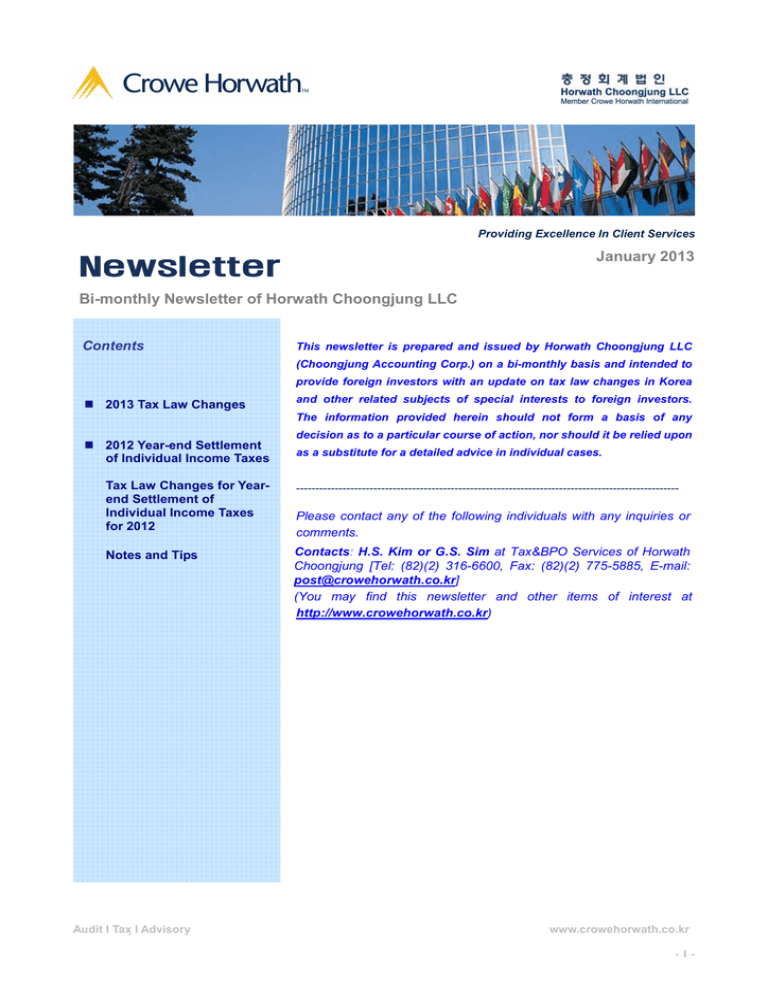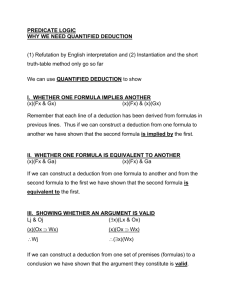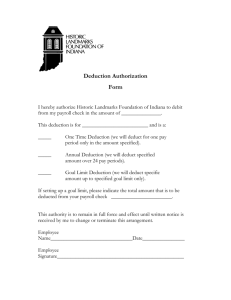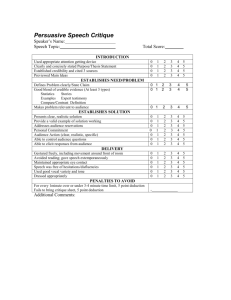Newsletter January 2013 Bi-monthly Newsletter of Horwath Choongjung LLC
advertisement

Providing Excellence In Client Services January 2013 Newsletter Bi-monthly Newsletter of Horwath Choongjung LLC Contents This newsletter is prepared and issued by Horwath Choongjung LLC (Choongjung Accounting Corp.) on a bi-monthly basis and intended to provide foreign investors with an update on tax law changes in Korea 2013 Tax Law Changes and other related subjects of special interests to foreign investors. The information provided herein should not form a basis of any 2012 Year-end Settlement of Individual Income Taxes decision as to a particular course of action, nor should it be relied upon as a substitute for a detailed advice in individual cases. Tax Law Changes for Yearend Settlement of Individual Income Taxes for 2012 --------------------------------------------------------------------------------------------------- Notes and Tips Contacts: H.S. Kim or G.S. Sim at Tax&BPO Services of Horwath Choongjung [Tel: (82)(2) 316-6600, Fax: (82)(2) 775-5885, E-mail: post@crowehorwath.co.kr] (You may find this newsletter and other items of interest at http://www.crowehorwath.co.kr) Audit l Tax l Advisory Please contact any of the following individuals with any inquiries or comments. www.crowehorwath.co.kr -1- January 2013 2013 Tax Law Changes We summarized below some of the major tax law changes for 2013 to keep you updated. All of the tax law changes we discussed below came into force for the fiscal year starting, or income earned, on or after January 1, 2013. 1. Corporate Tax Law (CTL) Reduction of tax limit on entertainment expenses for specially related parties (CTL-Article 25) In an effort to discourage companies from incurring entertainment expenses for specially related parties, the applicable rate to the revenue (defined) from specially related parties to calculate tax limit on entertainment expenses is reduced from 20% to 10% of the tax limit for ordinary entertainment expenses. 2. Individual Income Tax Law (IITL) Changes in formula for retirement (severance) income tax liability to increase tax burden (IITL-Article 55) In order to promote receiving retirement pay in a form of pension payment rather than in lump sum for stable settlement and development of the retirement pension schemes, retirement income tax burden is increased to the level higher than the minimum tax rate on pension income. Old provision □ Retirement income tax liability (computed in the order below) Amended provision □ Retirement income tax liability (computed in the order below) ① tax base / years of service ① tax base x 5 / years of service ② ① x tax rates (6%~38%) ② ① x tax rates (6%~38%) ③ ② x years of service ③ (② / 5) x years of service Reduction in threshold of financial income for comprehensive taxation (IITL-Article 14) In order to enhance effectiveness and fairness of taxation, the threshold of financial income (interests, dividends, etc) for comprehensive taxation is reduced from 40 million Won to 20 million Won. Any taxpayer whose financial income exceeds 20 million Won per year must file a global comprehensive income tax return together with necessary tax payment by the end of May in the following year. Audit l Tax l Advisory www.crowehorwath.co.kr -2- January 2013 3. Value-added Tax Law (VATL) Expansion of input VAT deduction with regard to VAT exempt transaction (VATL-Article 17) Before revision of the VATL, if a purchaser receives a regular VAT invoice (including 10% VAT) for a VAT exempt transaction, the input VAT therefrom may not be deductible, and a seller should issue a revised VAT invoice and file an amended VAT return for a refund of the output VAT. However, under the revised VATL, such input VAT shall be deductible in the case where it is substantiated that the seller has fully paid out the output VAT. The seller does not need to issue a revised VAT invoice nor file an amended VAT return for a refund of the output VAT. 4. International Tax Coordination Law (ITCL) Clarification of withholding tax rate on payment for the use of industrial, commercial or scientific equipment (ITCL-Article 29) Under the provisions of CTL, a payment for the use of industrial, commercial or scientific equipment (the “payment”) is classified as rental income, whereas the payment is treated as royalty income under a majority of tax treaties. Before revision of the ITCL, the payment was subject to the lower of the withholding tax rate on rental income (2%) pursuant to the provisions of CTL and a reduced withholding tax rate (0~15%) under the relevant tax treaty according to the existing National Tax Service (“NTS”) ruling. Through revision of the ITCL, if the payment is classified as royalty income under the relevant tax treaty, the payment shall be subject to the lower of the withholding tax rate on royalty income (20%) pursuant to the provisions of CTL and a reduced withholding tax rate (0~15%) under the relevant tax treaty. 5. Special Tax Treatment Control Law (STTCL) Introduction of limit on total income deductions (STTCL-Article 132-2) In order to prevent high income earner from receiving excessive income deductions, a limit on gross income deductions has been newly established. Audit l Tax l Advisory www.crowehorwath.co.kr -3- January 2013 Old provision <New provision> Amended provision □ deduction limit : 25 million Won □ deduction items subject to deduction limit : Insurance premiums, medical expenses, education expenses, housing funds, designated donations, housing related savings, investments on employee stockholders association or venture capital association, and credit card expenditures □ deduction items not subject to deduction limit : Personal deductions, insurance deductions, four major premiums, earned income social security pension statutory donations, and the savings, “disabled” related expenses 2012 Year-end Settlement of Individual Income Taxes Tax Law Changes for Year-end Settlement of Individual Income Taxes for 2012 An employer paying wage and salary income must withhod income tax monthly from the earnings of their employees based on “the Quick Tax Table” issued by the NTS and the total of these income tax withholding has to be paid over to the NTS (through the district tax office) by the 10th day of the following month throughout the year. After the year-end, in February of every year, the tax liabilities of employee's (excluding daily workers) prior year wage and salary are then finalized by its employer through the declaration of year-end settlement of exact payroll withholding taxes in Korea. Based on the results of year-end settlement, the employer shall make necessary adjustments for any overwithholding (or underwithholding) in the February payroll accordingly. Major tax law changes related to year-end settlement for 2012 are as below: Criteria for housing funds special deduction (Individual Income Tax Law, Presidential Decree (“IITL-PD”) §112 ④, ⑤) The gross salary ceiling for non-house owning workers is increased from KRW 30 million to KRW 50 million for application of ‘monthly housing rental deduction’ and ‘principal and Audit l Tax l Advisory www.crowehorwath.co.kr -4- January 2013 interest payment of home rental loans’ borrowed from the individual who does not run the rental business. The head of a household who does not have spouse or dependents can also deduct the above housing funds special deduction. Overseas education expense deduction (ITTL-PD §110-3 ④) The education expense for students who study abroad should meet the qualification below for claiming the special deduction. The overseas high school and university students do not need to meet the qualification to claim special deduction. Qualification for overseas education: the preschool children and elementary/junior high school students would be applied. - Students who study abroad at one’s own expense based on the Regulation of Overseas Education (Article 5), or - Students who live abroad with a person having duty of care for 1 year or longer. Income deduction rate increased for direct debit card/cash receipt usage (STTCL §126-2) To encourage a healthy consumption culture, the income deduction rate for direct debit card usage is increased from 25% to 30%. To activate the traditional street market, the taxable income deduction rate for credit card/cash receipt usage paid in the street market is increased to 30% and additional deduction limit of Won 1 million is also allowed. Other changes The progressive tax rate which was increased as of January 1, 2012 will be applied for the year-end settlement (38% income tax rate is applied for taxable income of Won 300 million or more). The effective income brackets and tax rates are as follows. (*) Local income tax will be additionally imposed at 10% of the individual income tax liability. Audit l Tax l Advisory Income tax base (in Won) Tax rate Up to 12 million 6% 12 ~ 46 million 15% 46 ~ 88 million 24% 88 ~ 300 million 35% Over 300 million 38% www.crowehorwath.co.kr -5- January 2013 The fully tax deductible donation can be carried forward to the next 3 years (formerly 1 year) for claiming the special deduction. The youth (15 years to 29 years of age) who joins/joined small/mid sized companies (defined) during the years 2012/2013 can enjoy 100% income tax credit for 3 years from the joining date. Notes and Tips When using the receipts provided from simplified year-end settlement service operated by NTS The simplified year-end settlement service available at www.yesone.go.kr operated by the NTS is a one-stop service where the taxpayers may collect the receipts required for income deduction claim for their year-end settlement. The simplified year-end settlement service is an internet-based service that shows the allowable amount of deduction that a taxpayer can take for himself/herself and his/her dependents. A print-out of the screen displaying such records is used as a valid supporting document that they can submit to their withholding agent. The taxpayer would need to register his/her dependents in the website first in order to view their deductibility records (such as their medical and insurance fees). The taxpayer should verify whether those receipts meet the income deduction qualifications under their responsibility. Due care for excessive deduction Once the year-end tax settlement is filed with the tax office, the tax office reviews whether the taxpayer applied the income deduction excessively over the deduction ceiling and notifies to the taxpayer, in the case of any findings, to file an amended income tax return through the tax withholding agent (the employer). If a taxpayer applied the deduction excessively over the deduction ceiling, he/she should pay penalty on top of the income taxes. As such, before claiming deductions, each taxpayer needs to review the deduction criteria with due care. If a withholding agent (the employer) files a considerable number of insincere year-end tax settlement returns for its employees, the tax office may undertake a comprehensive review on the whole withholding tax returns filed by the employer. Audit l Tax l Advisory www.crowehorwath.co.kr -6- January 2013 <Most frequent cases where the taxpayers claim excessive tax deduction over the limit> Examples Deduction claims for dependents who Detail - Basic/additional/special deductions for the have earned income of more than Won dependents who have earned 1 million earned/business/severance income and capital gains in total of more than Won 1 million are not allowed. Duplicated dependents deduction - Children dependent deduction by both parents is not allowed. - Parents dependent deduction by multiple direct descendants is not allowed. Deceased or overseas emigrant dependents deduction - Basic deduction for the dependents who are deceased or who emigrated overseas before immediately preceding year (i.e., deceased /emigrated by 2011) is not allowed. Excessive pension savings deduction - Deduction of pension savings on behalf of spouse or dependents is not allowed. - Deduction of pension contributions saved during the year (i.e., 2012) is not allowed if such savings are terminated early during the year (i.e., 2012) Excessive insurance deduction - Insurance deduction paid for the dependents who are not listed on the basic deduction dependents is not allowed. Excessive education expense deduction - Deduction of graduate school education expense paid for direct descendants or siblings is not allowed. - Deduction of the expenses for preliminary or pre-course education, for overseas university transfer or language study abroad, which is not a regular education course, is not allowed. Excessive medical expense deduction - Shared medical expense deduction by siblings is not allowed (only the taxpayer who supports his/her parent may claim deduction). - Deduction of nursing payment or postnatal care center payment as part of medical expense deduction is not allowed. - Medical expense deduction which was reimbursed by the insurance company is not Audit l Tax l Advisory www.crowehorwath.co.kr -7- January 2013 allowed. Excessive housing fund deduction - Deduction of interest payment of loans for long-term housing mortgage for the taxpayer who owns 2 houses or more as of year-end (i.e., 12/31/2012) is not allowed. Excessive credit card usage deduction - Deduction of credit card usage on behalf of siblings is not allowed. - Duplicate deduction of children’s credit card usage by both parents is not allowed. * * * * * Horwath Choongjung LLC Member Crowe Horwath International PMAA Jaram Building, 16th Floor, 566 Dohwa-dong, Mapo-gu, Seoul 121-815, Korea TEL: (82)(2) 316-6600 FAX: (82)(2) 775-5885 E-mail: post@crowehorwath.co.kr Website: http://www.crowehorwath.co.kr Horwath Choongjung LLC is a member of Crowe Horwath International, a Swiss association. Each member firm of Crowe Horwath International is a separate and independent legal entity. Horwath Choongjung LLC and its affiliates are not responsible or liable for any acts or omissions of Crowe Horwath International or any other member of Crowe Horwath International and specifically disclaim any and all responsibility or liability for acts or omissions of Crowe Horwath International or any other Crowe Horwath International member. Audit l Tax l Advisory www.crowehorwath.co.kr -8-



